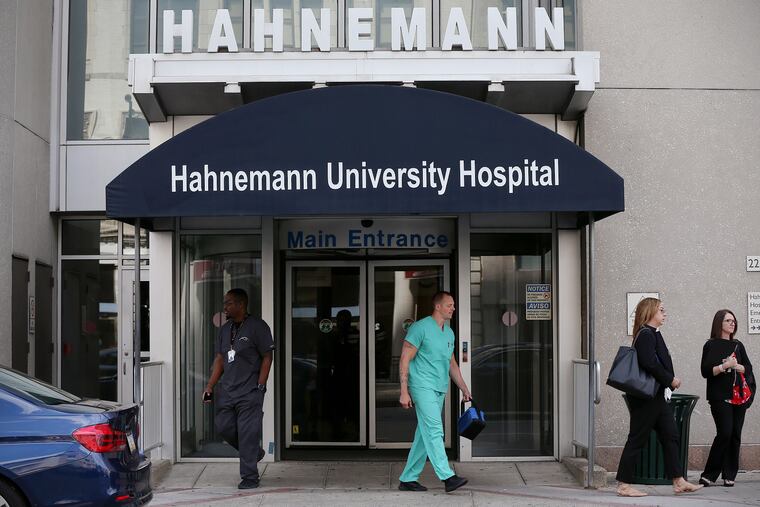Jefferson CEO: Hahnemann’s closure is another canary in the health-care coal mine | Opinion
I believe we should not waste more time assigning blame, or waiting for Washington to solve our local problems.

The bankruptcy of Hahnemann University Hospital in Philadelphia is a local tragedy and a national warning sign. The community loss is obvious — the demise of a provider that patients rely on, the loss of jobs for dedicated employees including physicians and nurses, orphaned medical residents, and the forfeiture of an important site for Drexel University College of Medicine.
Hahnemann's closure is also personal. I did my medical school training at Hahnemann and then devoted four years in the early 2000s as CEO of Drexel University Physicians, and then as dean, to bridge the gap between the hospital ownership and the university.
Sadly, I see Hahnemann’s closure as history repeating itself. I’m having a “back-to-the-future” moment recalling when I was responsible for medical education at Drexel University in 2003, when Tenet closed the Medical College of Pennsylvania (MCP) Hospital. MCP had inherited the pioneering Woman’s Medical College, founded in 1850, and Woman’s Hospital of Philadelphia, founded in 1861. The first medical school to admit women, it led a new and necessary focus on women’s health while pioneering gender equality. MCP’s untimely closure created disruptions for patients, faculty, and residents similar to what we are seeing with Hahnemann.
» READ MORE: Hahnemann bankruptcy hearing is postponed as residency slots auction heats up
Back then, we worked hard to care for those patients at other hospitals while keeping those residents in the Philadelphia area. In 2007, we published an article in Academic Medicine recommending steps to ensure the continuity of residents’ education following a hospital closure, and outlining the concerns at play when those residents are employed by for-profit institutions. I hoped the article would help ensure what happened at MCP would never happen again. It saddens me that we could republish that article today, and just substitute Hahnemann for MCP.
So now the proverbial canary has died — a second time.
As physicians we are taught to not just treat the symptom, but to look for its underlying cause. I believe that approach applies now — not just to what happened at Hahnemann, but also to how we maintain the greater Philadelphia area as an academic-medical-center region of excellence while fulfilling our mission of caring for the underserved.
I am incredibly proud of the heroic job of our doctors, nurses, and other employees at Jefferson as well as those at our partner academic medical centers, including Temple Health and Einstein Healthcare Network, which have met the needs of most Hahnemann patients and resident physicians displaced through no fault of their own.
I am also incredibly appreciative of my fellow CEOs at Cooper University Health Care, Christiana Care Health System, Temple, Einstein, Main Line Health, and Philadelphia College of Osteopathic Medicine who have spent hundreds of hours working to ensure that we keep the future doctors who had chosen Philadelphia to do their training at some of the nation’s leading teaching hospitals. As the CEO of Jefferson Health, I am also proud that our Jefferson Health Abington facility has been a major clinical campus for Drexel University medical students.
» READ MORE: Hahnemann University Hospital closure upends career paths for 570 doctors-in-training
Our consortium’s successful bid to obtain the Hahnemann hospital license was entirely based on a shared, community-minded vision. We are willing to work with anyone who believes they have a long-term alternative solution for how the Hahnemann site can best serve the community’s health needs. While it is estimated that Philadelphia has too many hospital beds when measured against projected future demand, there are still many gaps in vital clinical areas, such as behavioral health and caring for underserved groups, including low-income residents.
I believe we should not waste more time assigning blame, or waiting for Washington to solve our local problems. Rather, we must come together to deal with the myriad health-care issues affecting Philadelphia. These include unacceptable health inequities by zip code, underinvestment in socioeconomic determinants of health, and our history of not working together on these issues. While these are national challenges, our consortium can establish Philadelphia as a leader in overcoming these seemingly intractable problems.
As a team, local institutions have taken necessary early steps: We came together to bid to retain ownership of St. Christopher’s Hospital for Children, and now a similarly mission-focused group is bidding to keep Hahnemann’s residency training program in the region. Philadelphia should not — and I would argue cannot — lose those residency positions without calling into question the academic integrity of our city’s top-notch physician training programs.
We look forward to working with Drexel University as it builds its campus with Tower Health. And we look forward to working with our elected officials in the tristate area, and with the Centers for Medicare and Medicaid Services, to salve the wounds of Hahnemann’s former patients and residents, while keeping Philadelphia strong and healthy.
Most importantly, we look forward to never again subjecting patients, students, doctors, nurses, and staff to another health-care calamity in Philadelphia.
Stephen K. Klasko, M.D., MBA is president of Thomas Jefferson University and CEO of Jefferson Health.